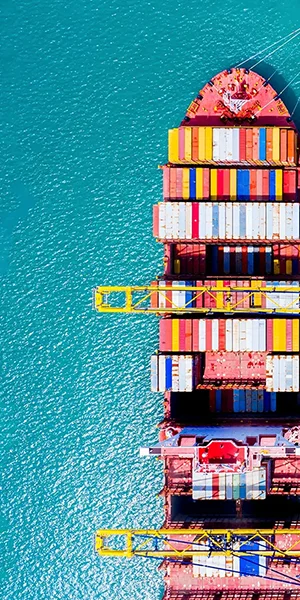(Re)in Summary
• Rising geopolitical conflicts are driving up insurance costs and fragmentation as insurers take a more restrictive approach to high-risk areas.
• The rise of sanctions and “shadow fleets” operating without insurance coverage are contributing to higher expenses and a more complex risk environment.
• Insurers are facing pressure to support customers’ sustainability transitions and address their own environmental impact, but more coordinated action is still needed from the industry to support decarbonization goals.
• Advanced technologies around risk monitoring and climate reporting are becoming more important tools for navigating geopolitical threats and regulatory demands related to ESG issues.
Ongoing and escalating conflicts in the Red Sea and broader geopolitical tensions are driving up marine insurance costs, leading to long-term consequences like fragmentation in the global shipping industry and the growth of “shadow fleets,” according to Frédéric Denèfle, President of the International Union of Marine Insurance (IUMI).
“All of the geopolitical conflicts are leading us to consider that freedom of trade is now under threat. This instability brings immediate consequences to international trade and shipping activity,” said Denèfle during a keynote speech at the IUMI Asia Forum Hong Kong 2024 on Wednesday, 6 May.
Denèfle estimated that between 150 to 175 vessels have been attacked in the Red Sea and Indian Ocean regions in recent months, with projected potential losses of US$5 billion for marine insurers. These spiking expenses will inevitably be passed on to consumers through inflated commodity and retail prices around the world, he added.
When markets divide
In a recent report, the International Monetary Fund (IMF) noted that more than 3,000 sanctions and embargoes had been imposed globally last year.
According to Denèfle, this proliferation of protectionism and reshoring has contributed to the rise of “shadow fleets” operating without insurance coverage (see story below).
These fleets have limited or no access to much of the Western world and are typically linked to sanctioned countries like Russia.
Casualties and any other events involving shadow fleets “will not be insured by the regular markets or picked up by the regular stakeholders.” Instead, coastal states may be forced to support all the expenses from any incidents.
Right now, the uninsured ships are mostly oil tankers and may “expand to other types of vessels.” Insurers will need to carefully monitor how these shadow fleets evolve to assess their underwriting of hull, cargo and P&I in the future, noted Denèfle.
All these challenges come at an inopportune time as marine insurers seek to also address and recover losses from climate impacts and the long-tail impacts of the COVID-19 pandemic on global trade volumes.
“We are facing a spiral which is not extremely positive for the industry. For us, we really chose a reduction of our market to ensure a reduction of risks,” said Denèfle.
This combination of trends means global trade will continue fragmenting as fewer goods and materials are exchanged between countries. With a slowdown in trade, insurers face smaller pools of cargo and shipping capacity to insure. Denèfle stressed this outcome would severely curb insurers’ ability to diversify and reduce their own risk.
Take the Yemen crisis. Major shipowners like Maersk have been forced to divert from the Red Sea and Suez Canal, rerouting cargoes around the Cape of Good Hope in South Africa to avoid attacks by Houthi rebels. The longer route adds 10 to 15 days and significant expenses to voyages.
At the same time, threats to maritime security have led global reinsurers like Lloyd’s of London and Swiss Re to take a more restrictive stance and charge steeper war premiums to sustain profitability amid rising claims. Several insurers have even stopped underwriting risks in the Red Sea altogether.
War risk premiums for vessels transiting the vital Red Sea trade route between Asia and Europe jumped from a nominal 0.07% in October 2023 to almost 0.5% to 0.7% by the end of December 2023.
Marine insurers must strengthen risk monitoring and embrace new technologies to navigate the complex geopolitical environment, according to Denèfle, saying that insurers need to closely track values, regions and overall exposures to protect relationships with clients and prevent disruption.
Already, marine insurers are “using more and more AI tools to follow up on ships and cargos wherever they are,” he said.
Charting new course
On another front, mounting pressure from regulators and society is pushing the global marine insurance industry to more proactively address ESG issues.
“Insurers now understand they have responsibility for ESG factors beyond traditional underwriting,” IUMI Secretary General Lars Lange said during a different panel.
The shipping sector currently accounts for nearly 3% of global greenhouse gas emissions, on par with aviation, explained IUMI’s Vice President Sean Dalton during a keynote on sustainability and ESG.
With the Paris Agreement targeting rises in global temperature, the International Maritime Organization (IMO) agreed in July 2023 to a zero emissions target by 2050.
Dalton said this “net-zero” strategy balancing emissions produced against those removed via renewables is crucial, as it changes how insurers assess insured assets and assume liabilities.
As investors more closely scrutinise the sustainability credentials of companies globally, marine insurers are reconsidering how to better support their customers’ transitions through frameworks like the United Nations (UN) Principles for Sustainable Insurance.
Launched in 2012, the four principles provide a framework for managing ESG issues and strengthening resilience. To date, 162 organisations have adopted them, representing over 25% of the global premium volume and US$14 trillion in assets under management.
Still, Dalton acknowledged more meaningful action and industry partnerships are needed given the stakes at hand. IUMI, for example, is responding by stepping up advocacy, raising awareness and backing the Poseidon Principles for marine insurance to assess and disclose members’ climate alignment.
























